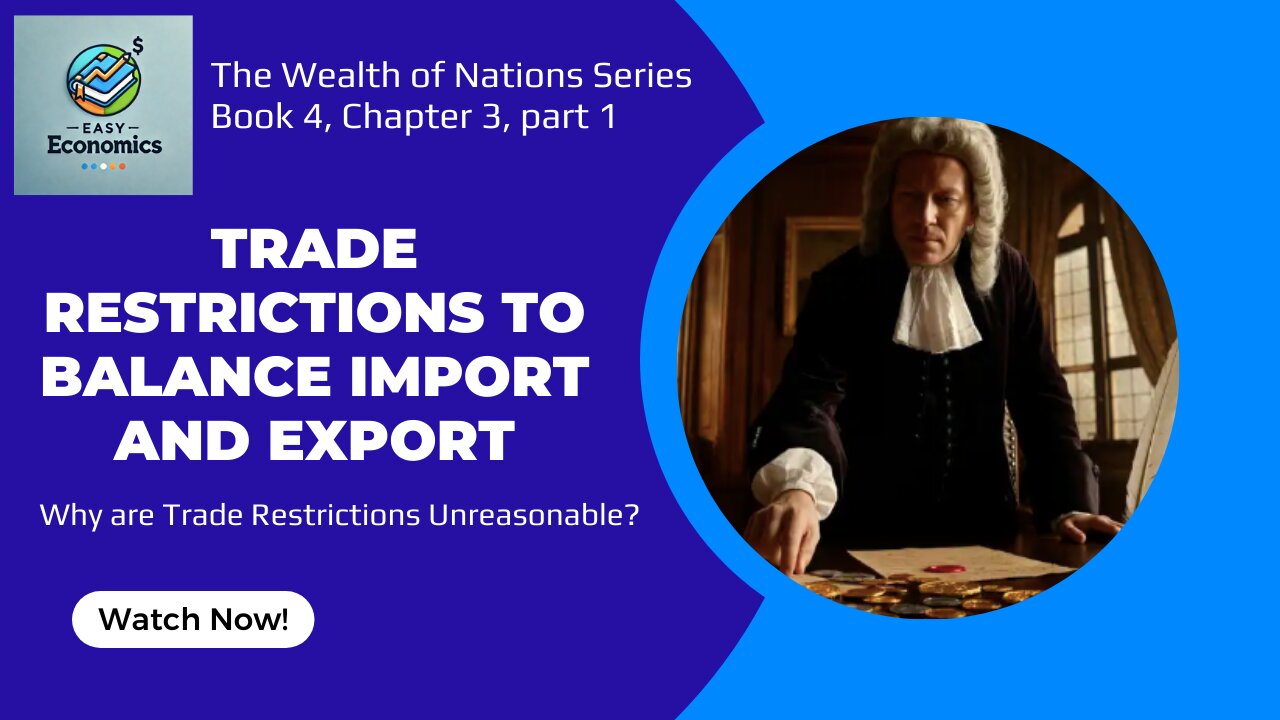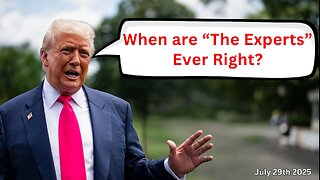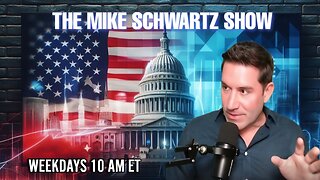Premium Only Content

The Wealth of Nations Book 4 Chapter 3 Part 1 - The Unreasonableness of Import Restrictions
Get the original book: https://amzn.to/3W5xeku
In this video, we explore the economic impact of imposing trade restrictions on countries with an unfavorable trade balance. Discover how Britain’s high tariffs on French goods, like wine and linens, aimed to protect local industries but often led to unintended consequences like smuggling and strained international relations. We’ll break down the flaws in using customs data and exchange rates to measure trade balances and how national biases influence trade policy decisions. Learn about the role of bank money, especially in Amsterdam, in stabilizing exchange rates and securing international transactions. We’ll also discuss how currency practices, like minting costs and bullion deposits, affect the true value of money in global trade. Whether you're new to economics or looking to deepen your understanding, this video explains complex trade dynamics in simple terms, showing why free trade often benefits economies more than protectionist measures. Watch to uncover the hidden effects of trade restrictions and currency systems.
00:00 - Introduction to The Unreasonableness of Import Restrictions under the Commercial System.
00:15 - Import Restrictions and Duties
00:43 - Impact of Tariffs on Trade
01:18 - National Prejudice and Monopoly Interests
01:32 - Benefits of Free Trade
02:05 - Re-exporting French Goods
02:39 - Measuring Trade Balance
02:52 - Customs Data and Exchange Rates
03:51 - Influence of Coinage Practices
04:18 - Bank Money vs. Regular Currency
04:52 - Role of Small States and Banks
05:32 - Amsterdam Bank's Practices
06:00 - Deposits and Receipts
07:36 - Creditors and Withdrawals
08:05 - Stability of Bank Money
08:27 - Bank of Amsterdam's Financials
09:23 - Conclusion
09:45 - Get The Wealth of Nations
-
 DVR
DVR
VSiNLive
1 hour agoA Numbers Game with Gill Alexander | Hour 1
9 -
 LIVE
LIVE
The Big Mig™
3 hours agoAct Blue, Magic Mortgage Money Laundering Scheme
5,073 watching -

Matt Kohrs
10 hours agoMARKET OPEN: Stocks Rocket, Trade War News & Earnings Season || Live Trading
11.6K2 -
 1:25:02
1:25:02
Dear America
2 hours agoHere’s EVERYTHING We Know About The “White” NYC Shooter… + Trump Secures MAJOR Deal With EU!!
112K83 -
 LIVE
LIVE
Badlands Media
4 hours agoBadlands Daily: July 29, 2025
3,971 watching -
 1:01:27
1:01:27
Part Of The Problem
12 hours agoDave Smith | The System is Broken | Part Of The Problem 1290
6.09K9 -
 LIVE
LIVE
Wendy Bell Radio
6 hours agoWhen Are "The Experts" Ever Right?
7,736 watching -
 LIVE
LIVE
JuicyJohns
2 hours ago $1.07 earned🟢#1 REBIRTH PLAYER 10.2+ KD🟢 !loadout
114 watching -
 LIVE
LIVE
The Mike Schwartz Show
2 hours agoTHE MIKE SCHWARTZ SHOW with DR. MICHAEL J SCHWARTZ 07-29-2025
5,088 watching -
 1:09:29
1:09:29
Dialogue works
13 hours ago $0.34 earnedLarry C. Johnson & Pepe Escobar: Trump's Pressure Backfires, Russia Ignites Unstoppable BRICS Unity
8.51K8